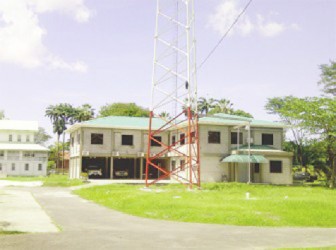A Partnership for National Unity (APNU) is calling for the recently set up Central Intelligence Unit (CIU), which remains shrouded in secrecy, to be governed by a legislative framework and not by political bosses.
As many questions continue to be asked about the work of the unit and what work it is involved in,

APNU’s Winston Felix told the Stabroek Sunday that there is need for legislation regarding the agency as there is no form of accountability.
Asked about the issue, Leader of the Alliance For Change (AFC) Khemraj Ramjattan said that like the general public his party is also in the dark about the agency as there is no public information on its employees or its terms of reference. He signalled his attention to take the issue to the National Assembly in an effort to get answers.
According to Felix, a body such as the CIU should be legislated and should not be left to individuals who are members of the ruling political party to determine what it should do, how it should be staffed, managed and to provide the kind of service it ought to be providing.
“There needs to be a legislative framework which will circumscribe the many issues… In terms of accountability, my view is that they should be answerable to a parliamentary oversight committee…,” Felix said, pointing out that the FBI and CIA in the United States are answerable to legislative bodies and as such Guyana has a precedent to follow.
He pointed out that there is still no public knowledge on who is in charge of the agency and what its work entails.
“No one knows how members of staff are disciplined…you don’t know about the employment and staffing arrangement, you don’t know about the discipline, you don’t know about the work they are supposed to be doing…,” the APNU parliamentarian and former commissioner of police said.
He said APNU has concerns and there is a whole range of issues that need to be understood about the agency.
“A Partnership of National Unity is not satisfied with the establishment of that body and the fact that the public does not know the work of that grouping and the laws which regulates it,” he added.
No one knows who heads the body or where the footage captured by the dozens of Closed Circuit Television (CCTV) cameras set up around the city goes.
Late last year, Home Affairs Minister Clement Rohee had said that a board had been established to oversee the functioning of that unit which is located in the compound of Castellani House. He had said too that the use of the footage had to be cleared by this board. Numerous attempts by this newspaper to ascertain who makes up this board or gather any information in relation to who heads the facility have been in vain.
When quizzed on the issue last year Head of the Presidential Secretariat Dr Roger Luncheon had said that the unit had no head. He went on to say that the information that is collected by the unit is shared with the police.
However, senior persons in the force have indicated that it has nothing to do with the CIU and that no footage from the cameras has been used to solve crimes. This newspaper was pointed in the direction of the Ministry of Home Affairs for any answers on the unit.
It was at the height of the crime spree back in 2005 that government had promised to install the cameras. At that time it was felt that the cameras could go a long way in helping to solve some of the crimes being committed in the city, especially armed robberies that soared towards the end of that year despite a heightened police presence. However, the installation of cameras did not begin until August of 2011.
Luncheon, when quizzed about the usefulness of the cameras had responded, “I don’t think that any has so far been used as evidence in court but they have been used as far as I am aware to investigate different offences.” He did not explain what those “different offences” were, but insisted that the cameras were functioning.
Many have raised concerns about the purpose of the cameras, while they are seen as a plus when investigating crimes and serious traffic accidents.
Meanwhile, Felix feels that the Customs Anti- Narcotic Unit (CANU) should also be covered by legislation as while it is known what sort of work the officers of the unit are involved in, there is no knowledge about how persons are hired or of the recruitment standards of the unit. He questioned what laws circumscribe the conduct of the unit officers as the only thing that is known is that they enforce the Narcotics Drugs and Psychotropic Substances Act.
“The prisons have a prisons act, the fire service has fire service act, the police have a police act and a police disciplinary act, the defence force has an act. What is happening with CANU and the intelligence agency?” Felix questioned.
He described the act of firing officers of CANU based on a failed polygraph test as a “lawless act” adding that to have the organisations run “at the whim and fancy of political individuals opens both systems to abuse by people in authority and that is what APNU is concerned about.”
He noted that at various times CANU came under Ministry of Finance, Office of the President and now Ministry of Home Affairs and he questioned whether the latter is the correct place for the administration of the unit.
“I recognise that the Minister of Home Affairs ought to have a reporting responsibility to the nation on CANU, but the organisation ought to be set up with its own rules… proper officers [should be] appointed to manage that organisation and to report to the minister as the other organisations do,” Felix said.





